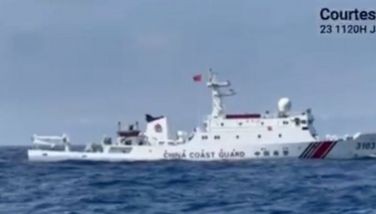Strengthening France-Phl ties in a rapidly evolving geopolitical context
From 23rd up to 29th June, the French Navy destroyer Lorraine is calling in Manila. This stopover is an opportunity for this French military diplomacy ambassador to strengthen ties with the Philippine Navy. As part of my first official visit to Manila since I took office in July 2022, I will be meeting the Philippine political and military authorities, in line with my predecessors, to discuss ways of strengthening cooperation between our two countries.
Last year, the Philippines welcomed the Vendémiaire frigate during its operational deployment in the Asia-Pacific region. Joint activities were carried out between our Navies, as well as with the Philippine Coast Guard.
Now that the pandemic is behind us, Filipino officers are taking part in the Marara and Croix du Sud (Southern Cross in English) training exercises organized by the French Armed Forces in the Pacific, which aim at reinforcing our capacity to assist populations in the event of a natural disaster. French and Filipino military personnel also take part side by side in multinational exercises, such as Sama-Sama and Balikatan in the Philippines, RIMPAC in Hawaii and Cobra Gold in Thailand.
These interactions attest to the regular defense cooperation between our two countries, which is necessary in view of the shared concerns, risks and threats we are facing: natural disasters, illegal, unregulated and unreported fishing, illegal trafficking, nuclear proliferation, obstacles to freedom of navigation or challenges to the law of the sea, and the effects of climate change.
France has a permanent presence in the Indo-Pacific. It is the only European nation committed at this level in the region. Nearly two million of its citizens are resident there. French Polynesia, New Caledonia, Wallis and Futuna, Mayotte and La Reunion are French islands, representing over nine million square kilometers of exclusive economic zone (EEZ), the largest in the region. Polynesia alone comprises 20 percent of the world’s atolls, and is therefore particularly concerned by rising sea levels.
To protect its citizens, territories, resources and interests, France relies on a permanent military presence based on its own soil and in partner countries such as Djibouti and the United Arab Emirates. More than 7,000 military personnel, 15 warships and almost 40 aircraft are available in the region, regularly supported by assets deployed from France. The Lorraine mission is a prime example of the deployment of high-end French assets.
As a stakeholder in the Indo-Pacific, France intends to contribute to regional security. Since 2018, it has adopted a strategy for the Indo-Pacific, based on multilateralism, respect for international law, compliance with its commitments as a member of the UN Security Council and the peaceful settlement of disputes. Despite the acceleration of regional tensions, this strategy is irrigating our forces’ activities in the Pacific.
France’s support for multilateralism is reflected in our day-to-day cooperation with partners such as the United States, Australia and Japan, as well as with ASEAN countries, including the Philippines. This year, as every year, French ships have been patrolling in the Asia-Pacific. The Jeanne d’Arc group, the Prairial frigate and the Rafale fighters deployed from the Charles de Gaulle aircraft carrier in the Indian Ocean to Singapore interacted with many of the region’s armed forces. Prior to its arrival in the Philippines, Lorraine itself operated with American and Japanese armed forces.
These cooperation activities aim at improving our interoperability with our partners. This is particularly necessary to ensure greater efficiency in the event of a crisis or natural disaster. During the assistance mission to the Tonga Islands in early 2022, France provided support to the populations affected by a violent volcanic eruption, alongside Australia and New Zealand as part of the FRANZ coordination partnership for HADR, which has been active for over 25 years to the benefit of South Pacific countries. In Vanuatu this year, the same system, activated through assets and material coming from New Caledonia, proved a highly effective support following the passage of two cyclones.
However, multilateralism is not just about military deployments; it is also forged on a daily basis, through international forums that bring together the highest authorities from the region’s countries. The Chief of Defense Symposium, the Shangri-La Dialogue and the International Maritime Security Conference all provide opportunities to discuss security issues faced by Asia-Pacific countries.
The Western Pacific Naval Symposium brings together the chiefs of staff of the region’s navies to find solutions to the shared topics such as maritime security. In fact, it was within the framework of the WPNS that France played a major role in drawing up the Code for Unexpected Encounters at Sea, which today enables regional navies to communicate, and which was subsequently adopted as part of the ASEAN Defense Ministers’ Meeting forum. France will assume WPNS presidency in 2026.
In the French strategy, ASEAN is the central player in Asia Pacific, and its forum of defense ministers is strongly committed to reducing tensions. France, as announced by Armed Forces Minister Sébastien Lecornu in 2022 on the occasion of the Shangri-La Dialogue, intends to draw closer to this forum by all available means, in order to concretize its constant involvement for security in the region.
While France’s commitments in the Pacific are aimed at promoting and resolutely defending International Law including freedom of navigation, it does not in any way take part in territorial disputes. As a stabilizing power and a force for balance, initiative and solutions, France supports dialogue. Our military resources are non-aggressive, our deployments are predictable and carried out in accordance with the provisions of the United Nations Convention on the Law of the Sea. Their sole purpose is to defend the rules-based international order.
I hope that this official visit and the Lorraine stopover will reinforce the strong ties between our two nations and contribute to stability in the region.
* * *
Rear Admiral Geoffroy d’Andigné is joint commander of France’s military operations in the Asia-Pacific region (excluding Oceania), from the Strait of Malacca to the American coast. He is based in French Polynesia, where he also commands the armed forces stationed there.
- Latest
- Trending






























